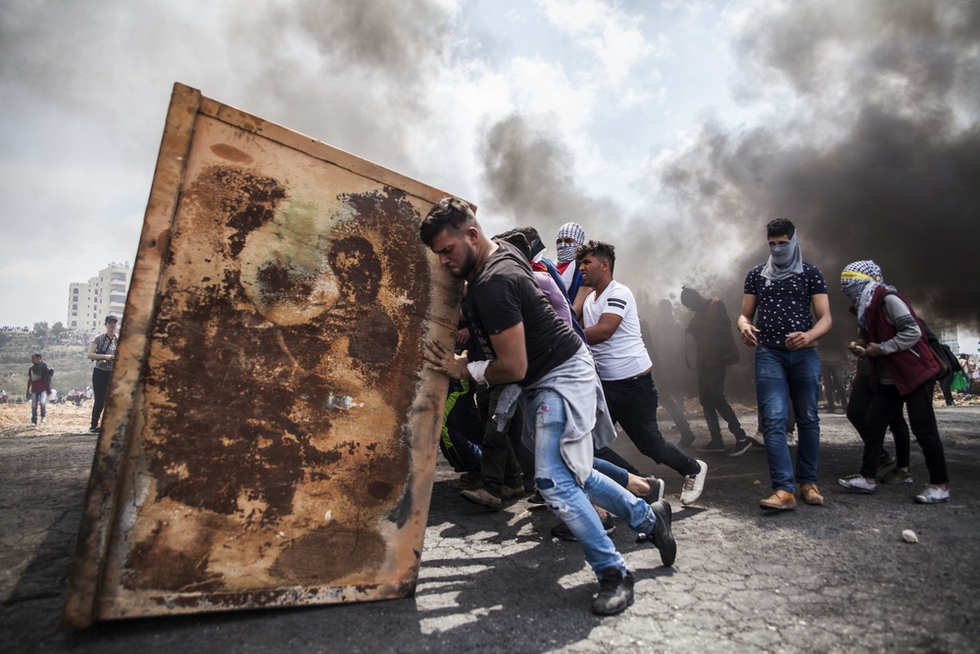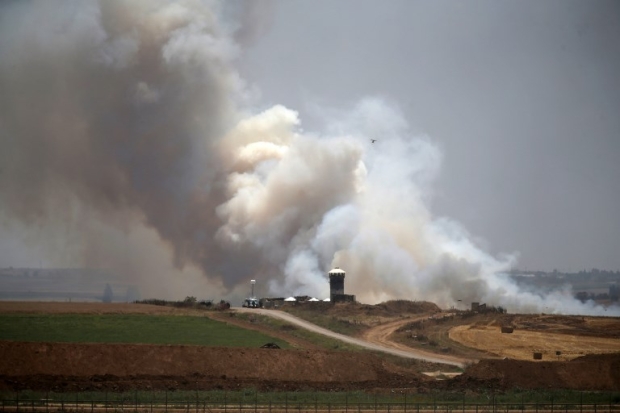LATEST: Gaza sees more protests and violence on Nakba Day, after 62 killed

Tuesday marks the 70th anniversary of the Palestinian Nakba - or catastrophe - and the culmination of the Great March of Return protests along the Gaza Strip's frontier with Israel.
- Mass protests are expected on Tuesday in besieged Gaza and the occupied West Bank.
- Israeli forces killed 60 Palestinians on Monday in protests near the Gaza "security fence", including an eight-month-old baby.
- The US officially moved its embassy to Jerusalem on Monday, which also marked the 70th anniversary of the founding of Israel.
We'll be keeping you updated here throughout the day.
Feel free to leave comments and news tips below; we’re also on Twitter @MiddleEastEye and Facebook.
Live Updates
Gaza health ministry spokesman Ashraf al-Qidra said tens of Palestinians have been injured by live bullets and tear gas shot by Israeli forces in the area near the fence separating Gaza from Israel.
Demonstrations along eastern Gaza have been more subdued today than yesterday, as the small Palestinian enclave is still reeling from the devastating toll of Monday's protests. Thousands participated in funerals today for the 61 killed a day earlier.
US ambassador to the UN, Nikki Haley, used her address to condemn Iran's "destabilising" presence in the Middle East.
She defended Israel and distanced America from any link between the US embassy move to Jerusalem and yesterday's violence.
"No country in this chamber would act with more restraint than Israel has," said Haley.
Karen Pierce, the UK's Permanent Representative to the UN, used her address at the emergency Security Council meeting to call for an independent UN investigation into the deaths in Gaza.
The British envoy condemned the deaths in Gaza on Monday and called for the easing of restrictions on movement, as well as calling for the funding of infrastructure on the Gaza Strip.
BEIT EL, Occupied West Bank - MEE correspondent Tessa Fox is on the scene in Beit El, an illegal Israeli settlement in the Occupied West Bank that has played host to protests today:
Israeli soldiers fired rubber bullets, live ammunition and deployed drones equipped with tear gas on young Palestinian protestors.
In response, Palestinians burnt tires and turned over skips in a bid to avoid being shot at by the Israeli forces.
“We came here because of Nakba but also because the US embassy moved yesterday. We want to send a message to Trump and the occupation government,” a 20-year-old protester told MEE.
“The suffering of people in Gaza, Jerusalem and ‘48 areas is the suffering of everyone. The pain is for the whole of Palestine.”
Nickolay Mladenov, UN Special Coordinator for the Middle East Peace Process, gave a summary of the situation unfolding on the Gaza Strip at a special session of the UN Security Council.
He used his address to condemn the actions of Israelis killing unarmed civilians in the buffer zone and the placement of improvised explosive devices by Hamas on the Gaza fence.
Mladenov also raised concerns about the prospect of the situation in Gaza leading to further instability in the region.
French Foreign Minister Jean-Yves Le Drian on Tuesday described the situation in the Middle East as "explosive" and criticised the United States for unilateral acts in the region.
Le Drian also criticised Israel for what he said was an unjustified level of violence.
"The situation in the Middle East is explosive, violence is doing the talking, war could loom," Le Drian told lawmakers in parliament.
"We are committed to the security of Israel but Israel's security cannot justify this level of violence," he said.
"We have disagreements with the United States," Le Drian said, referring both to the U.S policy on Iran and to the embassy move.
"We [also] have a disagreement about the method. Because in both cases the United States decided to act unilaterally," he added.
According to MEE correspondent Mohammed Asad, kites flown by Palestinian demonstrators and carrying improvised incendiary devices have sparked a fire in a forest located close to the Israeli side of the fence separating Gaza from Israel, east of Gaza city near the closed Karni crossing.
Gaza demonstrators have flown kites for the past six weeks. While most kites have not carried Molotov cocktails, some protesters have attempted to use the makeshift flying devices to reach into Israel and cause material damage.
Speaking before an emergency session of the UN Security Council, Israel's UN ambassador Danny Danon accused Hamas of using Palestinians protesters as "human shields".
Danon defended Israel's use of snipers against protesters in Gaza on Monday, claiming they were trying to breach Israel's security fence along the occupied territory's perimeter.
"They are not protestors. It's a mob that carries explosives and sometimes you cannot differentiate between terrorists and the people around them," he said.
Standing next to an image of a blazing fire, which he said showed an attack on the Kerem Shalom goods crossing between Israel and Gaza on Friday, Danon claimed the aim of the protests was to set similar fires inside Israel.
He dismissed international criticism of Israel's use of live fire, insisting the international community should instead blame Hamas.
Good afternoon,
Mustafa here from MEE's London office. Here are the latest updates on the ongoing protests taking place across the West Bank:
- Palestine's Red Crescent reported that 46 people have been injured in Bethlehem; 12 wounded from rubber-coated steel bullets, 33 injured from tear-gas inhalation, and one protestor was beaten.
- Confrontations between Palestinian protestors and Israeli soldiers happened in Beit Furik, Beita and Salfit towns around the city of Nablus; and in Al-Ram, a suburb north of the city of Jerusalem.
- In Ramallah, a protest in Deir Abu Mash'al was blocked by the Israeli army using a metal gate at the village's entrance. In Ni'lin, the Israeli settlement of Beit El and Al-Bireh, there were confrontations between Palestinians and the Israeli army.
- One Palestinian was injured by a live bullet in Hebron in a confrontation with Israeli soldiers in Bab al-Zawya, near the old city.
At least 45 people wounded in Bethlehem, according to the Palestinian Red Crescent.
Here's a breakdown of how Palestinian protestors were injured:
- 33 injured from tear-gas inhalation.
- 12 injured from rubber-coated steel bullets.
( Source: Palestinian Red Crescent)
The Gaza health ministry has reported that Nasser Ahmed Mahmoud Ghrab, 51, was shot dead by Israeli forces east of Al-Bureij refugee camp in central Gaza.
Ghrab's death puts the death toll to 61. Here's the full list of names of the people who have died since Monday.
(Source: Gaza health ministry)
Palestinian houses and cinemas, shops and mosques, train stations and markets were all lost in 1948, when hundreds of thousands were driven from their homes amid the violence of the Nakba.
Tarek Bakri, a researcher and archivist based in Jerusalem, was moved by the nostalgia and emotion still felt by many displaced Palestinians for their former streets and neighbourhoods and has tried to shed light on how Palestine looked before the Nakba.
“They live in the refugee camps in Jordan and Lebanon,” he told MEE. “They contact me via social media and send me pictures of their homes. I go out to find them and take pictures of how they ended up. It was not a desert, as the first Zionist settlers believed."
More of Bakri's before and after images can be found here.
On Tuesday, across the Gaza Strip, thousands of Palestinians participated in funeral processions, burying those killed by Israeli forces on Monday.
Relatives and friends crowded over the bodies of their loved ones - bodies shrouded in Palestinian flags or plain white linen. They kissed them goodbye for the last time.
In some funerals, shots were fired into the air as mourners chanted: “There is no God but God” and “With our souls, with our blood, we will redeem you, martyr.”
The atmosphere was very emotional, especially during the funeral of eight-month-old Leila al-Ghandour, who our correspondent Mohammed Asad says was her parents’ only child.
“Grief reigns in the Gaza Strip,” Asad says. “There is hardly any neighbourhood in Gaza right now without a mourning tent.
“People are very angry and want revenge. There are calls for more marches in coming days.”



